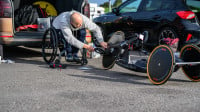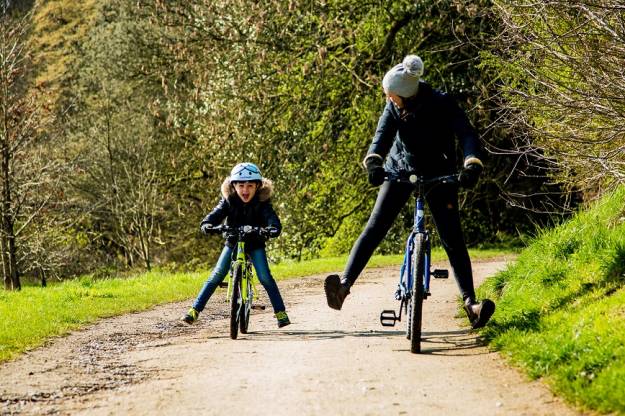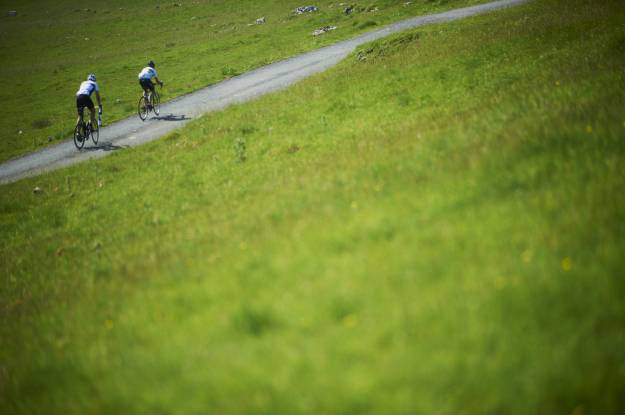Knowledge Level: Intermediate
Along with the familiar bars, gels and powders to fuel your rides, there is a dizzying array of supplements that will supposedly enhance your ability to pedal faster and for longer, but do any of them actually give you a proven performance boost? The Great Britain Cycling Team nutritionists tell you what works, what doesn’t and how to incorporate them into your training routine.
Eat a healthy and balanced diet
Before you even start to consider supplements, it is essential that you get your day to day basic nutrition right and this starts with a healthy and balanced diet. Keep processed and refined foods to a minimum, eat plenty of fresh fruits and vegetables and opt for high quality protein sources such as turkey, chicken and oily fish. Get this consistently right and it will improve your health and cycling more than any supposed super supplement. Similarly, on big training and event days, ensure you are taking on the right fuel at the right time.
However, for a number of possible reasons, real food might not fit in with training, racing or work. For example, if you cycle into work, a protein and carbohydrate recovery drink, is a quick and convenient way to get the nutrition you need. Similarly, the guys on the team will often use meal replacement products simply because they are quick and easy. On the bike, bananas are great but, after a few hours in a jersey pocket they turn to an unappealing mush.
Do I need extra protein?
Additional protein is often cited as being necessary if you’re training hard but, the actual amounts that your body can use, are not that high. A male cyclist will typically require 1.2-1.6 g/kg/day of protein, with female riders requiring 15% less. For a 80 kg male cyclist this translates to 96-128 g of protein which could be provided by:
3 egg omelette = 18 g
Almonds, handful = 5 g
Tuna sandwich, 1 drained can = 27 g
Cottage cheese, half cup = 18 g
X2 turkey breast steaks = 43 g
500 ml of whole milk = 16 g
Total = 127 g
As you can see, even hitting the upper end of the range doesn’t require huge amounts. This doesn’t mean that there is no place for protein powders as they can provide a convenient and controlled way to ensure you are getting the nutrients you need. If you have diet that is low in quality protein, such as some vegetarian diets, supplemental protein may be necessary. Look for a high quality whey protein. However, if you are already eating enough for muscular growth and repair, any extra will simply be broken down to be used for energy or stored as fat and the excess nitrogen will be excreted as urine.
Multi-vitamins, minerals and fish oil
These are true supplements. It is possible to get them from your diet but it can be a real challenge to do so. A decent multivitamin and mineral supplement won’t do you any harm and it can be viewed as simply covering your nutritional bases.
Fish oils, or more accurately the Omega 3 essential fatty acids they contain, as well as a number of health benefits, also have impacts specific to training and performance. Most noticeable is an anti-inflammatory effect. If you eat plenty of oily fish, you might not need to supplement but, as it is also its ratio to Omega 6, which is very prevalent in Western diets, that is important, most riders would benefit from 500-1000 mg per day. It is essential to buy a high quality supplement as fish/krill oils will be far higher in the important Omega 3 than cheaper cod liver oils.
So, what is going to make me ride faster?
There are no shortcuts or magic bullets, performance boils down to talent, smart consistent training and sound nutrition. Legally, there are very few ergogenic aids that have any real value and, at the elite level, we are yet to be 100% convinced of any. However, there are a few products that can potentially help at different phases of your training and racing cycle.
Caffeine
Although enhanced fat mobilisation and burning are often touted as being the reason for performance gains with caffeine, its main benefit, when taken in conjunction with some sugar, is to give you a neurological lift. This can either be before a hard effort such as a time trial, when a rider would take a caffeinated gel during their warm-up, or near the end of a long ride when they need a bit of a boost. Studies have shown that a dose of 3-6 mg/kg are required for a performance boost. A typical 250 ml cup of brewed coffee will contain 115 mg of caffeine but exact amounts can vary massively. We don’t use any sort of loading protocols though and are really aware on stage races that excessive caffeine can lead to anxiety and poor sleep. It is also worth noting that you do become habituated to caffeine so, to gain any ergogenic benefits, if you are a regular coffee drinker, you will need to taper your intake prior to events.
Sodium Bicarbonate
Buffers acid build up and might improve tolerance to heat due to plasma expansion. We use it with the Team Pursuit riders but I’m not 100% convinced by its benefits. However it seems to be part of the culture, the riders like it, so we do it. If you do decide to try it though, practice beforehand as the gastric side effects can be, well, explosive. We use a lower dose than you often see recommended of 0.2 g/kg which the riders take 2.5 hours before riding.
Beta Alanine
If Sodium Bircarbonate buffers acid in the plasma, Beta Alanine does a similar job within the cells. It can help complete repeated hard efforts in training but needs to build up in the body for 3-5 weeks before results are noticeable and some riders find the tingling side effects of the dose necessary (3.2-4.8 g/day) to be effective disconcerting.
Creatine
Can definitely be a help during strength and hypertrophic phases of training and we have been using it with the Team Pursuit riders for the last ten years. It can cause a bloated feeling though so we use a relatively low dose of 5 g/day.
What about all the other products available, do none of them work?
Many substances should theoretically produce a performance benefit but theory and practice are very different things. What works on paper, during animal testing or even with sedentary or poor to moderately conditioned human subjects, just doesn’t stack up with athletes.
Nitrates, such as from beetroot juice, have received a lot of attention recently but, for elite athletes, we're still to be convinced. However, for less well trained riders, there may be some benefits. Products such as BCAA’s (branch chain amino acids) and Leucine (an amino acid) are often claimed to have anti-catabolic (muscle breakdown) properties but, as long as you are obtaining enough quality protein in your diet, they aren't necessary. Ribose is a simple sugar and the starting point for the production of your cells energy source, ATP (adinosine triphosphate) but we are yet to see any strong research supporting supplementing with it.
Anti-Doping
This is probably the crux of our job and, if we are using a supplement, we have got to be 100% sure that it is safe, legal and there is no chance of contamination with anything that could cause a rider to fail a dope test. We ensure all of the nutritional products we use are tested by both the manufacturers and independently. If you are considering using a supplement, you should adopt the same policy and ensure that it has been thoroughly tested. It is the personal resposibility of all cyclists to ensure that any supplements they take are legal and pure. If in doubt, don't take it, ignorance isn't an excuse.











